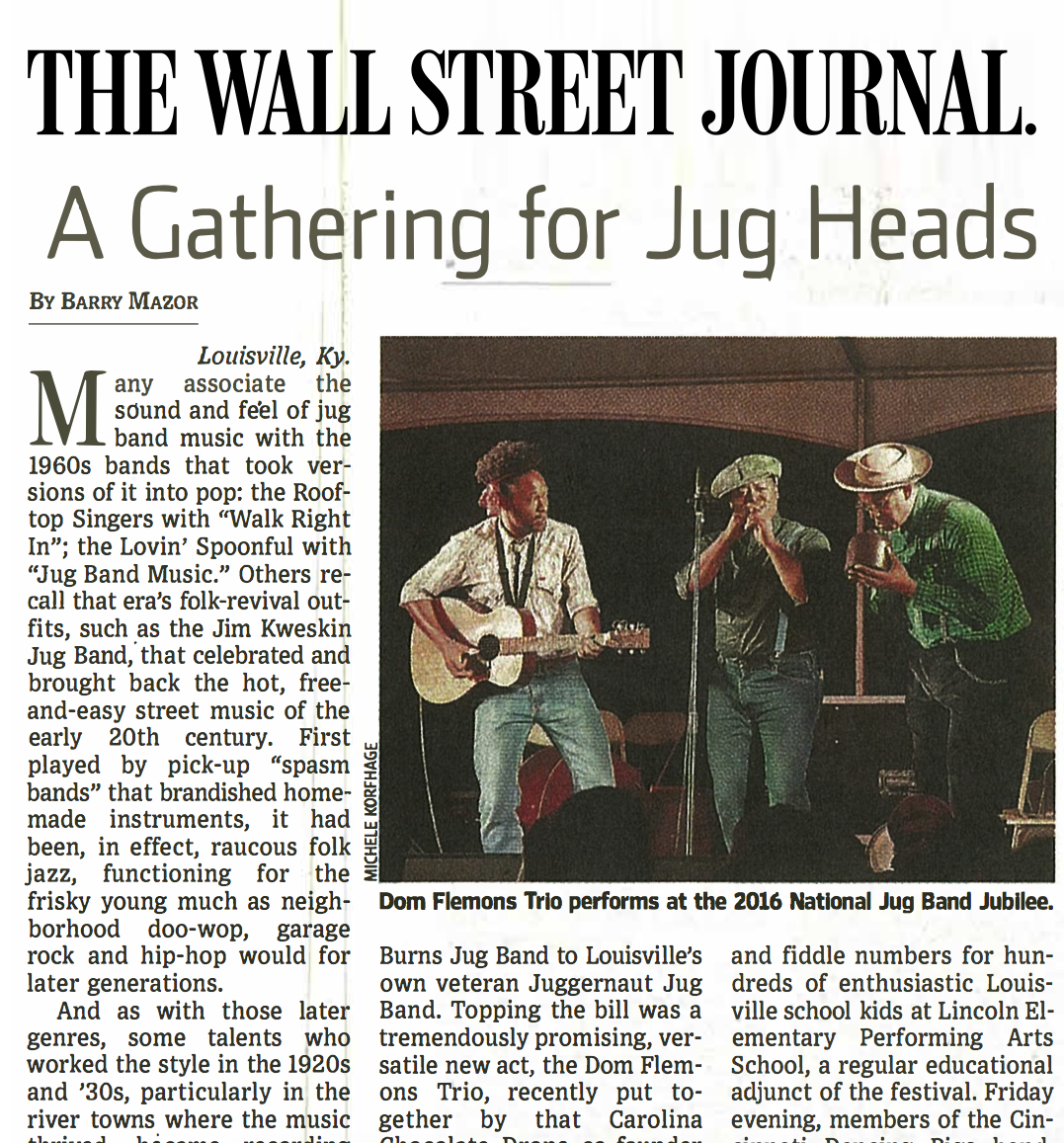A Gathering for Jug Heads – Wall Street Journal
Many associate the sound and feel of jug band music with the 1960s bands that took versions of it into pop: the Rooftop Singers with ”Walk Right In”; the Lovin’ Spoonful with “Jug Band Music.” Others recall that era’s folk-revival outfits, such as the Jim Kweskin Jug Band, that celebrated and brought back the hot, freeand-easy street music of the early 20th century. First played by pick-up “spasm bands” that brandished homemade instruments, it had been, in effect, raucous folk jazz, functioning for the frisky young much as neighborhood doo-wop, garage rock and hip-hop would for later generations.
And as with those later genres, some talents who worked the style in the 1920s and ’30s, particularly in the river towns where the music thrived, became recording stars-the Memphis Jug Band and Cannon’s Jug Stompers from Memphis; Earl McDonald, Clifford Hayes and Whistler’s Jug Band from Louisville. African-American music to begin with, it was quickly taken up by white country bands, too-washtubbass-wielding hillbilly outfits.
Louisville, whose stars were among the first recorded, had an abundance of the jugs that became the music’s defining bass instrument, as the bourbon producing center it remains. It serves today as the home of the National Jug Band Jubilee, an annual free festival held in the Brown-Forman Amphitheater on the banks of the Ohio that attracts practitioners from around the U.S. and beyond. From its founding in 2005, featured Jubilee acts have included Jim Kweskin, Geoff Muldaur and Maria Muldaur from the ’60s revival era, and such latter-day stars as the Carolina Chocolate Drops and Pokey LaFarge.
This year’s consistently pleasurable edition, staged Saturday, brought together eight practiced, audiencegrabbing groups-from Waterloo, Ontario’s Ever· Lovin’ Jug Band and San Diego’s G Burns Jug Band to Louisville’s own veteran Juggernaut Jug Band. Topping the bill was a tremendously promising, versatile new act, the Dom Flemons Trio, recently put together by that Carolina Chocolate Drops co-founder with fiddler-bassist Brian Far· row and percussionist Dante Pope. They wended their way through everything from close 19th-century harmony singing and vaudeville to, naturally, jug band standards such as Gus Cannon’s “Going to German,” Mr. Flemons’ inspired banjo work stunning those assembled. The trio is a thus-far rare example of young African-American talents bringing new life to this music.
Revitalizing and carrying forward the music is a hallmark of the Jubilee’s shows and mission. An hour was set aside on show day for work· shops offering tips for newcomers on playing the jug, bones and kazoos, bowing a saw and (with tots included) slamming on washboards. The previous afternoon, I caught the skillful G Burns Jug Band (named for a 1920s medicine show tune) playing banjo, jug and fiddle numbers for hundreds of enthusiastic Louisville school kids at Lincoln Elementary Performing Arts School, a regular educational adjunct of the festival. Friday evening, members of the Cincinnati Dancing Pigs band, among others, were jamming at the local Goodwood Brewing Company tap room.
The Jubilee itself-a nonprofit funded by individual and corporate donations-has been around long enough now to celebrate positive fallout from previous shows. Clint Davis, front man of the G Burns outfit, had grown up near Louisville, been inspired by the Juggernaut Jug Band, and later founded the San Diego group. High-powered Kentucky publicist Rodney Wenz, who died in 2008, had been inspired to found the Jubilee after seeing that same veteran local band and coming to a new realization of the music’s role in Louisville history, and of Louisville in the music’s story. (That story is tracked in historian Michael L. Jones’s book “Louisville Jug Music”; the author is among the current festival’s directors.) Rest assured, though; there’s nothing over- bearingly educational in experiencing the National Jug Band Jubilee. It delivers the good time the music promises.
BY: Mr. Mazor, based in Nashville, reviews country and roots music for the Journal.


